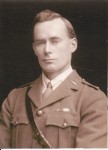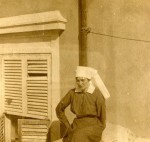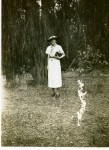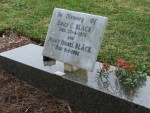BLACK, Emily Conyngham
Emily Conyngham Black was born in Tinamba near Maffra, Victoria in 1884, the second daughter of William Murray Black (1835-1925) of Grenock, Scotland and Mary Anne Bennison (1850-1912) of Port Albert. Tinamba was a grazing settlement, with a population 49 according to the 1891 census (Angus Watson, Lost and Almost Forgotten Towns of Colonial Victoria, 2003). The family apparently moved to the larger town of Sale (population 3442 in 1891) when Emily was a child. She was educated at the local State School where she won a writing prize in 1894.
Emily trained as a nurse at the Homeopathic Hospital in Hobart, in the steps of her elder sister Miss Ellen (aka Ella) Black who had trained there in 1900. There were also possibly Bennison family connections in Hobart.
War Service
Emily Black enlisted in the Australian Army Nursing Service (AANS) on 13 July 1917. She gave Ellen as her next of kin, the address for both being 340 Albert St, East Melbourne, the Trained Nurses Home 'Winfield'.
Their younger brother Allan Bennison Black had enlisted in August 1914, almost as soon as war was declared. He was seriously wounded in France in September 1916 and shortly thereafter awarded the Distinguished Conduct Medal for gallantry in action. Emily was one of a number of nurses who enlisted in the AANS following the wounding or death of a close family member at the front.
Emily sailed from Sydney on the 'Wiltshire', arriving in Egypt in October. She worked for six months with other Australian nurses at the 17th [British] General Hospital, a large 1800 bed facility in Alexandria for seriously wounded and sick soldiers.
In April 1918, she arrived in Salonika, where she worked in the 50th, 52nd and 42nd [British] General Hospitals. Conditions were appalling: the biographer of Jessie McHardie White, Black's matron, wrote '[White] and her staff contended with poor living conditions, extremes of temperature, threats to their safety from marauders, and with flies, lice, malaria, dysentery and typhus'. (Perdita M. McCarthy, 'White, Jessie McHardy (1870-1957), Australian Dictionary of Biography, Vol. 12; see also Jan Basset, Guns and Brooches: Australian Army Nursing from the Boer War to the Gulf War, 1992, pp. 82-90.)
Emily Black spent many weeks at a time during her war service in hospital, first with dysentery in Alexandria and then malaria in Salonika - the same illnesses that afflicted many of her patients. A British Medical Board in Salonika found that her malaria, caused by military service, required more convalescence and rendered her unfit to serve for six months. The Board recommended that she be invalided back to Australia. She left Salonika on 3 November 1918, convalescing en route in Cairo for almost a month, and finally arrived back in Australia in February 1919.
She was discharged from the AANS on 6 March 1919.
After the War
Emily recovered sufficiently well to resume nursing, at least intermittently. However her health had been permanently impaired by her war service. In 1928, she applied to the Edith Cavell Trust (which provided financial assistance for Victoria's sick and needy army nurses) because of an attack of malaria (Black, Emily, File, Edith Cavell Trust Fund, M291 National Archives of Australia). She was by then receiving a Repatriation pension of £1.10.0 per week, to which the Trust added a one-off grant of £20.
Emily's address in the 1920s and 1930s was Kensington Nurses Home, 5 Kensington Rd, South Yarra, which was also Ellen's address for a number of years.
Emily returned to Sale, probably when she retired or her health declined in the late 1930s or early 1940s. There she assisted Ellen in the boarding house of St Anne's Church of England Girls Grammar School until both women retired in 1950. According to the Gippsland Times, 23 December 1950, their valuable contributions would be greatly missed after they were obliged to retire. Ellen and probably Emily continued to live at the school until Ellen died in 1956.
Emily then moved to Perth where her unmarried sister (Mary) Isabel and late brother Allan had lived for many years. The sisters rented rooms in a house at 103 Railway Parade, Mt Lawley.
Emily died on 23 April 1976 in the Annesley Hospital Nursing Home in Perth. She is buried in the Anglican section of the Karrakatta Cemetery as are her father William and sister Mary Isabel.
A descendant by marriage has provided the following recollection: 'I remember her only as an elderly lady, she and her sister Isabel (Mary) were very "proper", gentle ladies. It's hard to imagine that she went overseas during WW1 - a very different life to what she had known in Victoria!'
Emily Black featured in the East Melbourne Historical Society's 2015 exhibition, 'Gone to War as Sister: East Melbourne Nurses in the Great War'. Her panel can be seen at Gone to War as Sister - exhibition panel 10
Thank you to Di and Kevin Briggs of WA for information about and photographs of Emily and Allan Black, and to St Anne's and Gippsland Grammar for the photograph of the Misses Black in 1947.
Janet Scarfe, Adjunct Research Associate, Monash
Updated 29 January 2017







